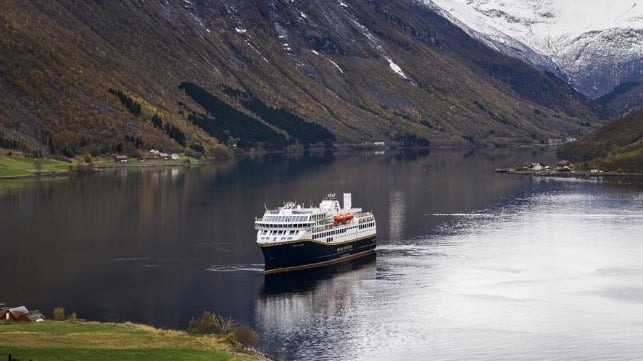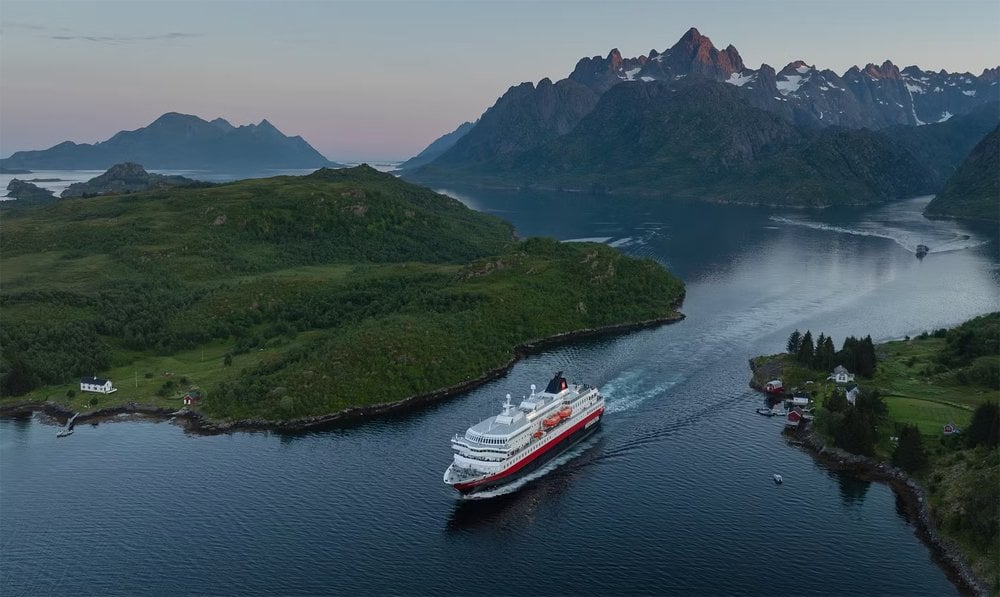First Climate-Neutral Sailings Using Biofuels Set for the Norwegian Coast

Historic firsts are scheduled for the iconic voyages along the Norwegian coast as competitors Hurtigruten and Havila Voyages have now confirmed the details of demonstration voyages that will be climate-neutral. Both companies are taking great strides to develop the trips, and they report that they can contribute to Norway’s planning and ambitions to lead in the race to climate neutrality.
Norway has been moving aggressively to push shipping to reduce its emissions and aim for climate neutrality. Regulations have already been passed that will require ships to eliminate emissions to enter Norway’s famed fjords, while the government has also supported pioneering efforts with batteries, ammonia, and hydrogen.
Hurtigruten, which has been the historic operator of the route between Bergen and Kirkenes, has scheduled the first trip for October 29. Its vessel Richard With (11,200 gross tons) will make the 3,100-mile round-trip voyage using 100 percent biofuel. The vessel, which was built in 1993, has also been refitted as a hybrid-battery ship and will connect to shore power wherever available during the sailing.
Hurtigruten highlights that it has invested €100 million in technical and environmental upgrades to its fleet in order to reduce CO2 and NOx emissions. In parallel, the company has gradually phased in the use of biofuels. This sailing will run on ‘HVO100’ (Hydrotreated Vegetable Oil), which is a waste-based advanced biofuel from the energy supplier St1.
"Our ships already sail on blended biofuel, but for the first time, we will carry out the entire sailing on 100 percent advanced biofuel. For us at Hurtigruten, it is important to do what we can to reduce emissions, and this voyage is an example of how biofuel can play a key role in achieving Norway’s climate goals," says Hedda Felin, CEO of Hurtigruten.

Huritgruten will operate the first demonstration voyage using advanced biofuel from renewable waste materials (Espen Mills photo courtesy of Hurtigruten)
Havila Voyages had announced its plans over the summer and has been working to secure a sufficient supply of liquified biogas to use on its LNG-fueled vessel Havila Polaris (15,776 gross tons). The vessel will load 200 cubic meters of liquified biogas at Polarbase outside Hammerfest on November 26. It will then proceed to Bergen, where it will arrive on November 30 and load an additional 150 cubic meters. The company reports it will have a sufficient quantity of biogas to operate the full round trip in combination with the ship’s battery pack.
“Since announcing this sailing during Arendalsuka in August this year, we have worked with our gas suppliers, Barents Naturgass and Molgas, to secure enough biogas to carry out the voyage. We are pleased that the delivery is now confirmed. The amount of biogas we will have on board is significant and will reduce our greenhouse gas emissions from this voyage by more than 90 percent,” said CEO Bent Martini.”
Havila operates four LNG-fueled ships to maintain the service along the coastal route. Hurtigruten has a total of seven ships for the route. The two companies each have contracts running till 2030 from the Norwegian government for the service.
They point out that biodiesel reduces emissions and will permit the company to claim a climate-neutral voyage. The biogas will not only reduce CO2 emissions but also other elements such as nitrogen and sulfur oxides.
“The more shipping companies that make sustainable choices, the better it is for our coast and the climate. When both companies that currently have contracts with Norwegian authorities demonstrate that stricter requirements are possible, these can be implemented from day one in the next contract period without a gradual phase-in, and we think that’s both positive and the only right thing to do,” said Martini.
The combined efforts, the company said will show the authorities that the route is at the forefront of addressing harmful emissions. Norway has enacted a phased zero-emission policy for its World Heritage fjords, requiring ships less than 10,000 gross tons to be zero-emission by January 1, 2026, and larger ships by 2032. The companies believe that with the increased supply of fuels, the coastal route is also preparing to adopt these standards.
